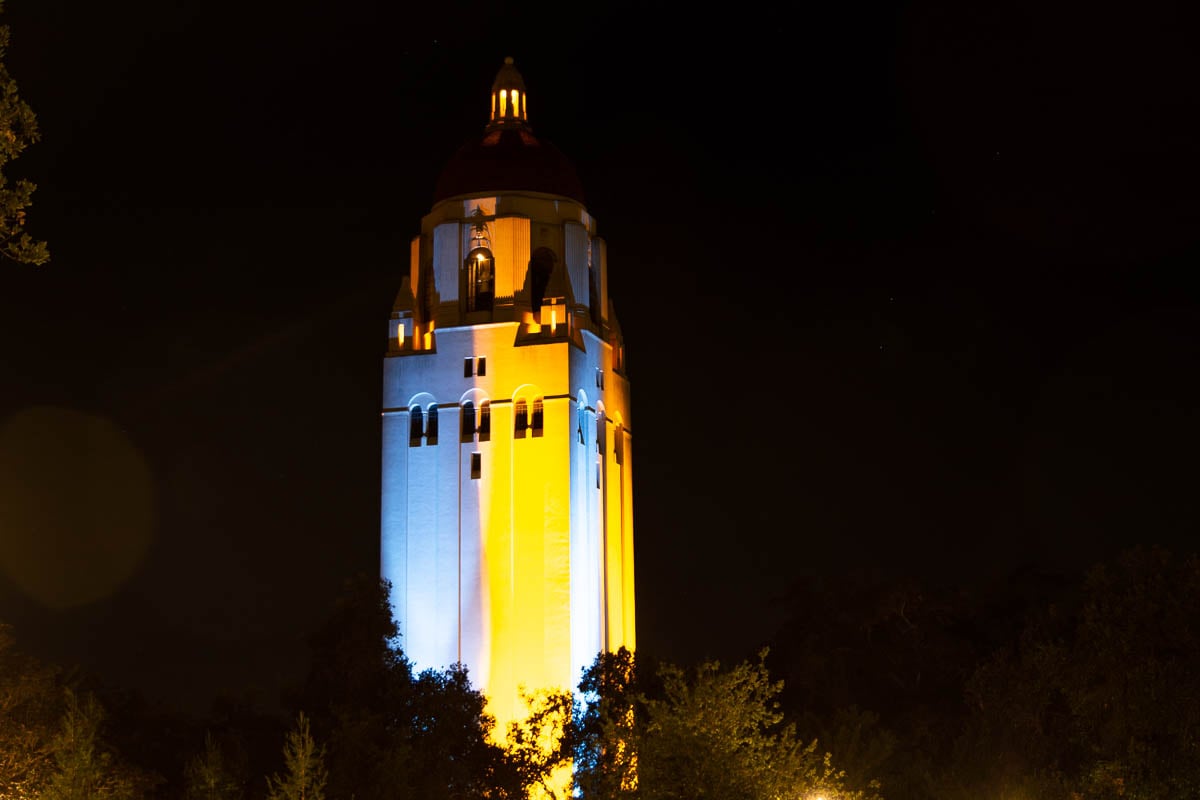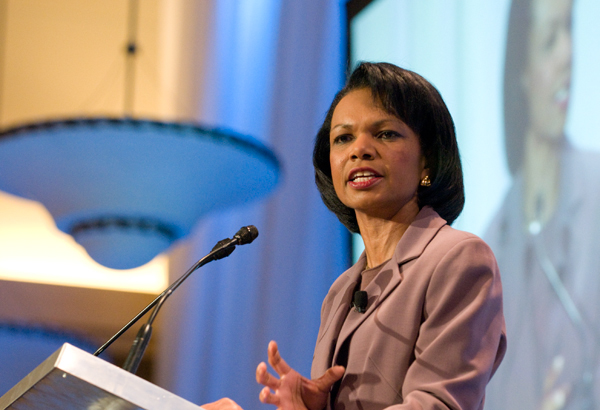On Friday, The Daily sat down with Hoover Institution Director Condoleezza Rice to discuss the current status of the Russian invasion of Ukraine, now entering its third week. The war has galvanized the Stanford community into action; as Stanford academic leaders speak out against the invasion and community members protest Putin’s war, students have also called for a stronger public response from University officials.
Rice served as the Director on the National Security Staff of President George H.W. Bush, Senior Director of Soviet and East European Affairs and the Special Assistant to the President for National Security Affairs from 1989 to 1991. She rejoined the highest levels of United States federal foreign policy as Assistant to President George W. Bush for National Security Affairs from 2001 to 2005. Rice was the 66th U.S. Secretary of State from 2005 to 2009.
The Stanford Daily [TSD]: Do you believe Putin can be convinced to cease his invasion of Ukraine with the West’s increasingly harsh sanctions and Ukraine’s steadfast resistance?
Condoleezza Rice [CR]: I have in my entire career never seen sanctions this strong against a major power. People are hoping that Putin can be convinced that he cannot achieve his aims by military means and that this would bring him to the negotiating table. I saw that President Biden just announced even further sanctions taking away most-favored-nation trading status.
Putin really believed he could overthrow the Ukrainian government in a matter of days. There’s now some frustration on his part. And while we have to keep up the sanctions, and we have to keep arming the Ukrainians, we have to be prepared for the fact that he could escalate the violence against civilians, and that’s the really awful cost of this war.
TSD: As you said, Putin has been frustrated. But do you believe that Ukraine has the potential to completely repel Russia’s invasion?
CR: I don’t think it’s time yet to give up on the possibility of the Ukrainians holding their capital. But let’s say that the Russians are able to bring their armored vehicles into Kyiv. Then they’re going to face a determined territorial and population defense. Every time a Russian soldier gets out of the tank, a 65 year old woman is going to be there to shoot them. And I don’t think that’s a very pretty picture.
Every time a Russian soldier gets out of the tank, a 65 year old woman is going to be there to shoot them. And I don’t think that’s a very pretty picture.
What the Russians seem to have settled on is shelling and sending missiles from outside of the city to break the will of the Ukrainian people and then enter the city. But they’re having a very difficult time breaking the will of the Ukrainian people.
TSD: You mentioned that you have never seen economic sanctions this fierce. Is there anything more that you wish that the United States administration was doing?
CR: I wish that we had the pace of transfer of weaponry now to Ukraine before the Russians invaded. I think that the Ukrainian armed forces would have been in a better position than they even are now.
TSD: What is your response to right wing media hosts such as Tucker Carlson and Sean Hannity recently theorizing that the United States has been funding biological weapon research in Ukraine?
CR: I think this is not a good time for any Americans to be engaging in theories about what the United States and Ukrainians may or may not have done. This is a time for unity in favor of the Ukrainians.
TSD: Do you believe that the invasion of Ukraine has caused a newfound determination to prevent and punish war that was not previously established in the West?
CR: I think it’s had a shock effect on the West. We’ve had horrific situations for civilians around the world, such as what happened in Syria. But this has been watched on television because it’s possible to get into Ukraine in ways that it wasn’t possible to get into Syria. Also it goes right at the heart of the international order as it was established after 1945. A friend of mine said that if you were to put these pictures in black and white, it would look like 1939. It has changed the calculations of a lot of countries. If Vladimir Putin was hoping to destroy NATO, he has brought a stronger NATO with a rearmed Germany at its center.
TSD: Even though NATO has committed now not to militarily engage with Putin, do you believe that the Ukrainian war has the potential to break out into the Third World War?
CR: We have to deter Putin from any belief or calculation that he might be able to extend what he is doing beyond Ukraine. The only way to do that is to stop him in Ukraine. I have long feared that if he believes that he has achieved his goals in Ukraine that there would be nothing stopping him from deciding to build a buffer and that might involve Poland or Lithuania and Kaliningrad, which is Russian territory. In order to reconnect Kaliningrad to Russian territory, it would require compromises of Polish and Lithuanian territory, so I think this is why it’s so important to stop his goals here.
And let me be very clear about what I mean about stopping it. I don’t want to talk in military terms. What are we trying to achieve? That an independent Ukraine remains. That the government of Ukraine is a government that is elected by the Ukrainian people, not a Russian puppet government. And that Ukraine maintains control over its own future. And that is what Putin had hoped to destroy.
TSD: On the topic of the Ukrainian government, what are your thoughts on President Zelenskyy?
CR: President Zelenskyy is now one of the most amazing figures of the early 21st century. I’ve always said countries sometimes get fortunate. The strength that he has shown, the bravery that he’s shown, the commitment to the Ukrainian nation but also to the values of Europe is just extraordinary. I think Ukraine is extraordinarily fortunate that it is Zelenskyy.
TSD: Do you believe that Stanford University and our university community is doing enough to support Ukraine?
CR: I’ve been heartened by the response. First and foremost to our Ukrainian students who are under tremendous pressures as they watch what’s going on back home. I’ve also asked us to remember that we have Russian students for whom Vladimir Putin is doing things that they had nothing to do with. Let’s make sure that we take care of them as well. And Stanford will continue to play its part, which is educating the best and brightest from around the world. Hopefully when this is over, we will bring even more students from Ukraine and from a different Russia one day.
Hopefully when this is over, we will bring even more students from Ukraine and from a different Russia one day.
As a short term symbol of our support, we lit Hoover Tower on Friday in the blue and yellow of the Ukrainian flag. This isn’t something that we would usually do as a matter of policy, but the Hoover Institution — the archives at least — were in many ways born out of the fight for freedom. The last elected prime minister of Russia before the Soviet Union, Alexander Kerensky — who was actually a liberal — lived out his life here at the Hoover Institution.

TSD: Speaking of a different Russia, could the combination of Putin’s frustration following the invasion and the economic sanctions drive either a revolt against Putin’s regime or a rejection of Putin’s appointed successors?
CR: I don’t know how precisely it comes about, but I cannot imagine Russia re-entering the international order with Vladimir Putin as its president. At some point in time, I think there will be a different Russia. And my own view is, however it happens, this misadventure in Ukraine has hastened the day when he will no longer be president of Russia.
This interview has been lightly edited for concision and clarity.
